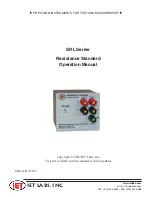
6.4. Connecting Calibration Gas
The AutoRAE 2 Cradle can accommodate two gas calibration gas cylinders (mixture or
single gas in each). In addition, there is a connection labeled “Exhaust,” for venting the
gas after it has gone through the AutoRAE 2 Cradle. All three connections are barbed to
secure the hoses to them. All gas connections are barbed to secure the hoses to them.
Appropriately non-reactive/non-adsorptive tubing with a 1/8" I.D. should be used (Teflon
for PID or corrosive or reactive gases, Tygon for others). The cylinders must have
demand-flow regulators (0 to 1,000 psig/70 bar) installed.
IMPORTANT!
Always check that the active gas configuration on the AutoRAE 2 Cradle and the
type/concentration of the actual calibration gases connected to the Cradle match before
you begin any bump test or calibration.
Cross-Sensitivities Determine The Order In Which Sensors Should Be
Calibrated
Gases used for calibration should be configured and connected to inlet 1 and then inlet 2
in the order in which the sensors should be calibrated. This applies to both a standalone
cradle and controller-based systems. Information on the order of calibration is available
in RAE Systems Technical Note TN-114.
If MultiRAE sensors have cross-sensitivities to the target gas(es) of other sensors
installed in the same instrument, the order in which such sensors are calibrated is
important, as time is required between calibrations to allow the sensors to clear after
exposure to cross-sensitive gas. To shorten the time required to perform calibration,
Calibration gas
cylinder 1
Calibration gas
cylinder 2
Exhaust
Summary of Contents for AutoRAE 2
Page 1: ......
Page 38: ...Select Exit to return the monitor to Normal Measurement Mode...
Page 43: ...When you click on Gas Config 8 the two gas bottles Gas Inlet 15 and Gas Inlet 16 are shown...
Page 76: ......
Page 95: ...Set the password for access to the AutoRAE 2 Note The default value is 0000...
Page 121: ......
















































